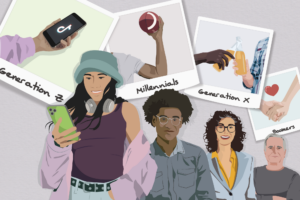Polarization in American Family Life is Overblown
February 23, 2022

Throughout the 2020 election, stories of families and friendships ripped apart by political differences were featured regularly in the press. Many also argued that numerous Americans had become trapped in ideological echo chambers. These narratives all fed into the larger national polarization thesis which suggested Americans were deeply divided and ideologically sorted into narrow social networks; unable even to engage with their families when they disagreed on political issues.
New data from AEI’s Survey Center on American Life reveals that these stories of division may be overblown and that there may be more cause for optimism than both traditional and social media projects.
While there were certainly cases where families struggled to reconcile political differences or became ideologically isolated, the American National Family Life Survey shows that relatively few Americans have stopped talking to family members over political issues. Moreover, many Americans report welcoming people they politically disagree with as guests in their homes.
Just over one in 10 (11 percent) say they ceased relations with a family member because of their political ideas while 88 percent state that they have not stopped talking to a family over politics.
It is worth noting, however, that there are clear ideological differences when it comes to functionally “canceling” one’s own family members. Here, the survey exposes the fact that very liberal Americans are twice as likely as any other ideological group to stop communicating with their family members over a political issue. Nearly a quarter (23 percent) of very liberal respondents say they have cut off a family member because of their political views, compared to only 9 percent of Americans who are very conservative. Political disagreement is not tearing families apart and few family members are “canceling” their own relatives – though ideology does matter.
My earlier research, in contrast, has shown that Americans are much more willing to end friendships over politics. As I noted in previous work: “a whopping 45 percent of extreme liberal identifiers have ended a friendship over politics—twice the figure of their conservative counterparts.”
Nonetheless, when it comes to socializing with and welcoming others who are politically different into one’s home – Americans do open their doors. The survey shows that one-third (33 percent) of Americans hosted others with divergent views in their private, personal space in the past month. Roughly another third (28 percent) report having had someone like this over in the past 6 to 12 months. Only 18 percent of Americans assert that they have never had someone with divergent political views over to their home. While these numbers may look a bit different once the COVID-19 pandemic ends, for now, Americans are not ideologically isolated.
Polarization and sorting have created a toxic political culture and have severely limited the ability of Americans to find consensus and compromise with one another. However, this new research demonstrates that polarization has not penetrated as deeply as the press and social media often depict. Americans not only welcome ideological diversity into their homes, but they are highly unlikely to cancel and reject family members with whom they disagree. While the media may oversimplify or exaggerate politically-based social divisions to generate attention, the fact remains that Americans are far more tolerant of family members and open to a diversity of ideas than it often appears.








